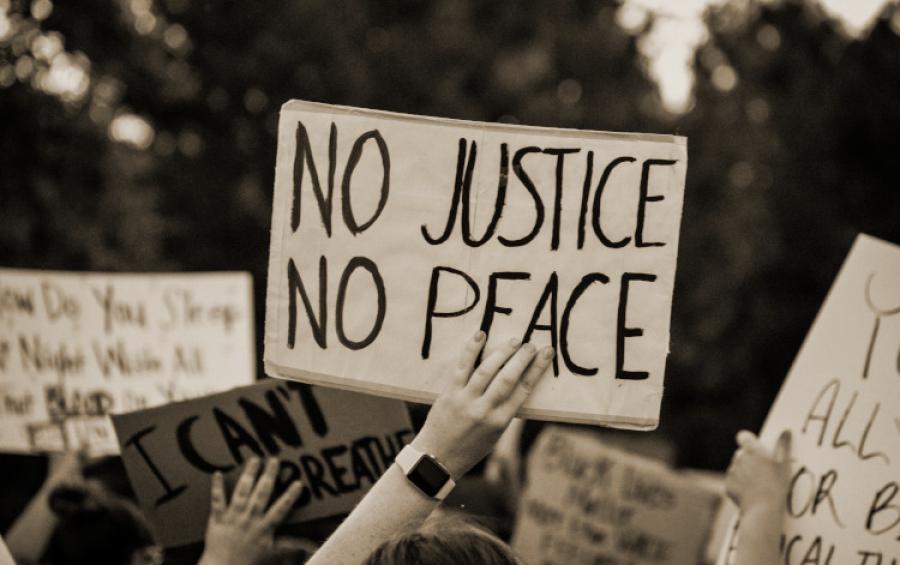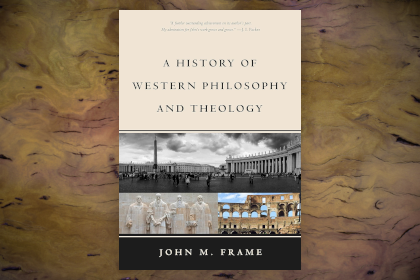Nobody’s Good Enough
Image

It’s easy to forget sometimes, but the book of Revelation reveals. There’s a lot of mystery in the book’s details, but if we step back and focus on what’s clear, what emerges is a beautiful expression of the greatest truths any human being can be blessed to know.
I was reminded of this recently as our pastor preached through Revelation 5-7. Flowing through the awesome scenes, strange creatures, and epic moments of these chapters is a retelling of the great story of all of Scripture.
A tragic problem
Chapter 5 continues the apostle John’s vision of God on His throne. God the Father is holding a sealed scroll and John is confronted with a question from a “mighty Angel.” It’s really the great question of the ages, since the transgression in Eden and the fall of the human race. It has long had the same tragic answer.
And I saw a mighty angel proclaiming with a loud voice, “Who is worthy to open the scroll and break its seals?” 3 And no one in heaven or on earth or under the earth was able to open the scroll or to look into it, 4 and I began to weep loudly because no one was found worthy to open the scroll or to look into it. (Rev 5:2–4, emphasis added)
A bit more context is important here. Whether we see Revelation as already fulfilled in history or yet to be fulfilled in the future, and whether we see it as mostly symbolic or mostly literal, what John witnesses in chapters 4-18 is a pouring out of God’s holy judgment on the earth. Later, when the seals of the scroll are opened, the outpouring of God’s wrath is unmistakable.
So the question, “Who is worthy… ?” means, “Who is worthy to judge sinners?”
It’s a bigger question that it may seem. It has the cosmic sense of, “Who’s qualified to be the judge of all the earth?” but also the everyday sense of, “Who has the right to bring justice?”
That everyday question resonates with all of us, because we’ve all been victims of the wrongdoing of others. We’ve all burned with a kind of rage that reflects God’s: “This isn’t right! It isn’t fair! Someone should pay! Someone should fix it!”
If we removed all the variants of that idea from the daily news feeds, there might be 80% less “news” in the world. There would sure be a lot less political commentary!
I doubt any of us made it past age three without feeling a hunger for justice. And if we jump ahead to Revelation 6, we find a vivid example in John’s vision.
When he opened the fifth seal, I saw under the altar the souls of those who had been slain for the word of God and for the witness they had borne. 10 They cried out with a loud voice, “O Sovereign Lord, holy and true, how long before you will judge and avenge our blood on those who dwell on the earth?” 11 Then they were each given a white robe and told to rest a little longer … . (Rev 6:9–11)
Like all of us (but especially those who have suffered cruelly at the hands of those with more power than them) the souls of Revelation 6:10 cry out for the wrongs to be righted. They cry out for the offenders to pay, and the inequities to be equalized.
Nearly everyone sees that piece of the great human tragedy. The world is crushed and bleeding with “man’s inhumanity to man.”
But that’s not really even the worst part. If we read on in Revelation 6, we find ourselves subtly reminded of the question posed to John back in chapter 5. The victims of Revelation 6:10 aren’t turned loose on a wicked world. They’re told to wait, and eventually the judgment that comes to the earth doesn’t come from them. The timing doesn’t come from them. The process isn’t designed by them. The delivery isn’t performed by them.
And so we’re back to John’s weeping observation in 5:4. Even the victims aren’t worthy to judge the wicked. Nobody is.1
While we’ve all felt the sting of unfairness against us, the truth is that we’ve also all delivered unfair pain to others.
All have turned aside; together they have become worthless; no one does good, not even one.” 13 “Their throat is an open grave; they use their tongues to deceive.” “The venom of asps is under their lips.” 14 “Their mouth is full of curses and bitterness.” (Rom 3:12–14)
The tragic problem is that the world’s full of injustice and nobody is good enough to judge it or powerful enough to fix it. We’re all part of the problem and can’t truly even begin to be part of the solution.
Justice can’t be dealt by one of us because whatever justice is brought would have to be against us.
Now we know that whatever the law says it speaks to those who are under the law, so that every mouth may be stopped, and the whole world may be held accountable to God. 20 For by works of the law no human being will be justified in his sight, since through the law comes knowledge of sin. (Rom 3:19–20)
A joyful truth
Those who don’t understand the gospel can’t see why the Christian faith is such a joyful faith. But when you get it, there’s a music in every part of life from that moment on. The music doesn’t erase the pains and losses of life. It runs through them. The injustices are all still there all around us, and sometimes we’re the ones committing them. But we see them in a completely different way.
Going back to the painful reality John faced in Revelation 5:4, we need to see what happens next.
I began to weep loudly because no one was found worthy … “Weep no more; behold, the Lion of the tribe of Judah, the Root of David, has conquered, so that he can open the scroll and its seven seals.” (Rev 5:4–5, emphasis added)
John should stop crying—partly because justice will finally be done, but mostly because of the One who solves the justice problem and how He solves it. He solves it not only for victims, but also for wrongdoers!
We learn more about Him and what He accomplishes as the scene unfolds.
And between the throne and the four living creatures and among the elders I saw a Lamb standing, as though it had been slain, with seven horns and with seven eyes, which are the seven spirits of God sent out into all the earth. 7 And he went and took the scroll from the right hand of him who was seated on the throne. 8 And when he had taken the scroll, the four living creatures and the twenty-four elders fell down before the Lamb, each holding a harp, and golden bowls full of incense, which are the prayers of the saints. 9 And they sang a new song, saying,
“Worthy are you to take the scroll and to open its seals, for you were slain, and by your blood you ransomed people for God from every tribe and language and people and nation, 10 and you have made them a kingdom and priests to our God, and they shall reign on the earth.” (Rev 5:6–10)
He’s called the Lamb, because the way He fixes the world is through the sacrifice of Himself. He’s the One pictured in all the sacrifices of lambs over the centuries.
For it was indeed fitting that we should have such a high priest, holy, innocent, unstained, separated from sinners, and exalted above the heavens. 27 He has no need, like those high priests, to offer sacrifices daily, first for his own sins and then for those of the people, since he did this once for all when he offered up himself. (Heb 7:26–27)
The joyful truth here is that though judgment is poured out on the earth in these verses, many are not the targets of that judgment. The One Who Is Worthy has made it possible to escape God’s justice.2 These escapees aren’t worthy to judge the earth, but they’re clothed in cleanness (Rev 6:11, 7:13-14, 9:4) and safely kept from its path.
Christ will bring about a great reordering of the world, one that ends injustice and includes personal forgiveness.
Note that this reordering was obtained at great personal cost to the Son of God: 6:6 “a Lamb standing, as though it had been slain” (see also 5:9, 12; 7:14). This is the measure of God’s love for us (Eph 5:2).
Note also that this reordering changes everything, not just the personal destiny of those who are forgiven.
and you have made them a kingdom and priests to our God, and they shall reign on the earth.” (Rev 5:10)
After this I looked, and behold, a great multitude that no one could number, from every nation, from all tribes and peoples and languages, standing before the throne and before the Lamb, clothed in white robes, with palm branches in their hands, 10 and crying out with a loud voice, “Salvation belongs to our God who sits on the throne, and to the Lamb!” (Rev 7:9–10)
“Therefore they are before the throne of God, and serve him day and night in his temple; and he who sits on the throne will shelter them with his presence. 16 They shall hunger no more, neither thirst anymore; the sun shall not strike them, nor any scorching heat. 17 For the Lamb in the midst of the throne will be their shepherd, and he will guide them to springs of living water, and God will wipe away every tear from their eyes.” (Rev 7:15–17)
We hear that life is unfair when we’re pretty young and soon learn that it’s true. If we’re honest, we also learn that we aren’t just sufferers of unfairness; we also dish it out.
But Christ is going to fix this mess. And for those who believe,3 the fix is not only a merciful escape but blessing beyond imagination.
Among mere humans, nobody’s good enough to condemn the world, much less straighten it out. Christ is more than good enough, and through faith His goodness counts as our own.
For our sake he made him to be sin who knew no sin, so that in him we might become the righteousness of God. (2 Cor 5:21)
Aaron Blumer 2016 Bio
Aaron Blumer is a Michigan native and graduate of Bob Jones University and Central Baptist Theological Seminary (Plymouth, MN). He and his family live in small-town western Wisconsin, not far from where he pastored Grace Baptist Church for thirteen years. In his full time job, he is content manager for a law-enforcement digital library service.
- 12 views

Discussion